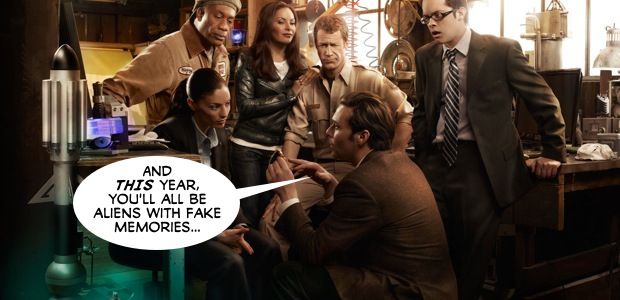How important is knowing what you're going to get when you watch to a television series? We've gotten so used to shows being either long-form arcs with "mythology-based" episodes or self-contained procedurals with little-to-no episode-to-episode continuity that it feels like a strange question to ask, but nonetheless: How much is continuity - and consistency - central to our entertainment and enjoyment? Do we want to be surprised, or do we want to know what we're getting?
The show that brought this to mind was last week's Eureka premiere on Syfy (Spoilers for that episode follow); it looked for the majority of the episode that Eureka was going to do a "Everything you know is wrong!" reboot of the show's status quo for the second season premiere in a row, with the crew of the Astraeus apparently returning to Earth four years after they'd left and finding everyone and everything they'd left just a little… different. It was a bold move, but one that turned out to be a swerve (Not that the characters know it, just yet), much to my relief. As it was revealed that things weren't quite as they'd seemed, I found myself wondering why I was so happy that everything I'd been watching for the last hour turned out to be that old cliche of a dream, hoax and imaginary story - Wouldn't I rather have a show that is unafraid to shake things up, I asked myself, than one that just pretended to?
Your mileage may (and will) vary on that question, of course, but what I realized the more I thought about it is: You can only shake things up so much before the audience loses the connection that keeps them watching in the first place. It's one thing to do a continuity reboot at the start of season four, but to then attempt a time jump that includes multiple characters acting - well, just plain out-of-character a year later…? That's too much for me; it's the point where it feels as if the show is trying to hard to change, and doesn't care too much about those who've been along for the ride all along.
It's a weird and difficult line to walk, of course; how to keep enough of the status quo in place to please longterm fans while still making enough bold moves to underline the "anything can happen!" nature of science-fiction and the tension of drama in general. But in long-running serial fiction, there's an implied agreement between creator and consumer that is, essentially, "As long as we're in agreement that these are the rules" - whatever those rules may be for whatever stories are being told - "then anything else is fair game." For most shows, those rules include the relationships between characters and doing some kind of wholesale switch up of something so sacrosanct is a once-in-a-lifetime (or, perhaps, generation? Thinking about DC Comics and their various Crisises and reboots now) thing that can't be repeated without breaking the agreement.
Continuity, therefore, may be far more important than I'd initially have thought, but still less important than consistency; that's something that is core to long-form storytelling in general, whether it be comics, movie franchises or whatever… but definitely, without question, something that is core to long-form television storytelling. We tune in every week to be entertained and surprised, sure, but only surprised in ways in which we're ready for. Too much of a good thing can be off-putting, I suspect.

